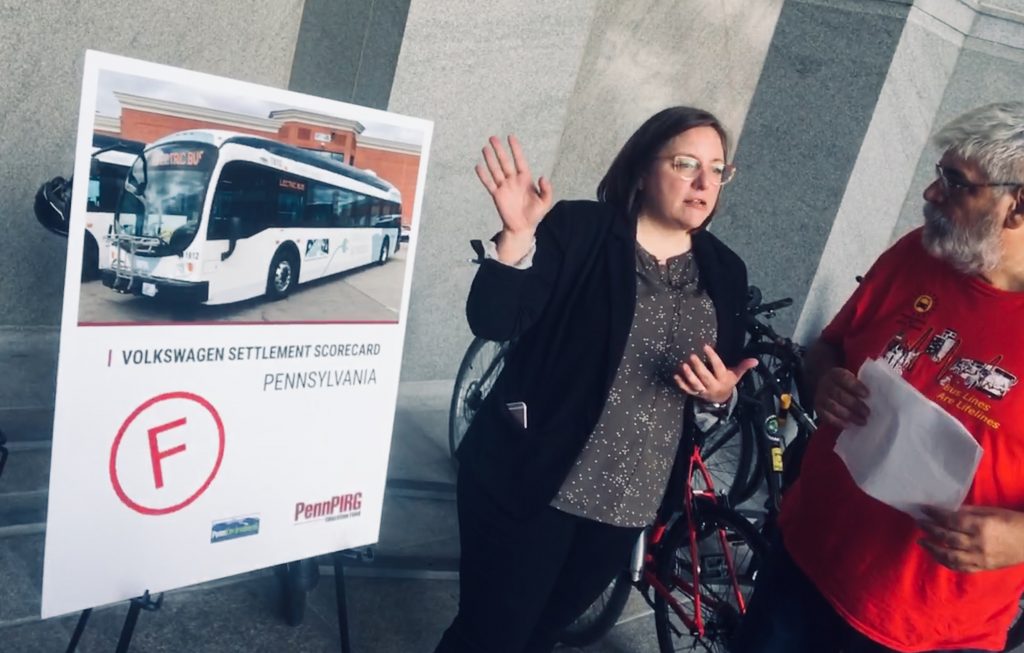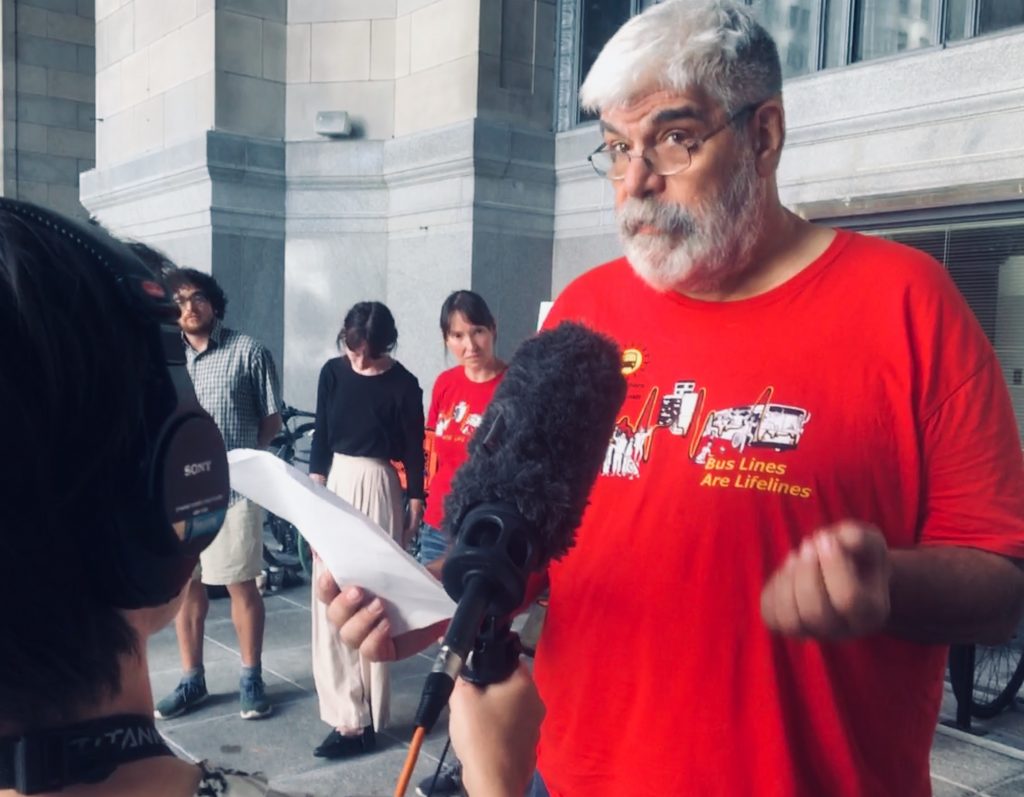
On Tuesday, September 17th, Pittsburghers for Public Transit joined our allies PennEnvironment, PennFuture and the Clean Air Council to unveil a new report from PennEnvironment and PennPIRG: “Volkswagon Settlement State Scorecards“.
The report grades states on how they are using monies from the massive $4.3 Billion settlement paid by Volkswagon in 2016 after they were caught lying and cheating on their vehicle emissions tests. Nearly $3 Billion of that money was paid into an Environmental Mitigation Trust which was split amongst the states affected by VW’s fraud to be spent on “transportation projects that reduce pollution in an effort to mitigate the harm done by Volkswagen through their emissions cheating.”
The state of Pennsylvania received $118.5 Million from the Environmental Mitigation Trust fund. However, Pennsylvania’s performance has been lackluster (to put it kindly). Overall, the Scorecard report gave our state an “F”-grade on the way that our elected officials are spending the money.
Pennsylvania’s Environmental Mitigation Trust monies are an incredible opportunity to transition our state away from the dirty, gasoline/diesel-burning transportation that is our region’s largest contributor of greenhouse gas emissions. But we need a progressive, transparent, participatory vision to get us there – and that vision must include the transition towards a fully-electric public transportation system.
This is an urgent public health issue as well as much as it is an environmental issue. As PPT Coordinating Committee member Dean Mougianis puts it, “We know that transit workers and regular transit riders are disproportionately affected by the health risks posed by regular exposure to diesel emissions. According to the Union of Concerned Scientists, “railroad, dock, trucking, and bus garage workers exposed to high levels of diesel exhaust over many years consistently demonstrate a 20 to 50 percent increase in the risk of lung cancer or mortality…”. Beyond that, a very disturbing fact is that so many of our most transit-dependent citizens, the people who need the bus the most, are the very same people who live in areas most prone to respiratory illnesses caused or made worse by poor air quality. The bus, the vehicle that can take them out of the bad air should not be contributing to the bad air.”
The new PennEnvironment and PennPIRG study highlights that need. This is why PPT joined our allies in continuing our call that lawmakers take this opportunity seriously and create real plans to funnel this VW money into electric buses and charging infrastructure for public transit.
Read PPT Coordinating Committee Member Dean Mougianis’ full press conference comments below. And see the reporting from these local outlets for more information.
Media coverage:
- Advocates Say Vehicle Electrification Is The Future And PA Is Lagging Behind, Margaret J. Krauss, WESA
- Environmental advocates push state to think bigger with $188 million from VW settlement, Bill O’Toole, NextPittsburgh

Press Conference Comments by PPT Coordinating Committee Member Dean Mougianis
Pittsburghers for Public Transit is a grassroots organization of transit riders, workers and residents that seeks to defend and extend public transportation. While we are happy at PPT that Pennsylvania will be receiving the benefit of funds from the VW mitigation settlement, we feel it is vital that those funds be used to bring us closer to a zero-emssions public transportation fleet. Put simply, the money should be used for more electric buses and other non-pollution-emitting infrastructure. What our transit advocacy work has taught us is that public transit affects a surprising number of areas of people’s lives beyond just transportation – everything from economic development to food security. Two of the most important of those areas are the health of the public and the state of the environment. We know that transit workers and regular transit riders are disproportionately affected by the health risks posed by regular exposure to diesel emissions. According to the union of concerned scientists “railroad, dock, trucking, and bus garage workers exposed to high levels of diesel exhaust over many years consistently demonstrate a 20 to 50 percent increase in the risk of lung cancer or mortality.” If that’s something we can do something about, then it’s something we should do something about.
Beyond that, a very disturbing fact is that so many of our most transit-dependent citizens, the people who need the bus the most, are the very same people who live in areas most prone to respiratory illnesses caused or made worse by poor air quality. The bus, the vehicle that can take them out of the bad air should not be contributing to the bad air.
One of the biggest things that motivate our work is the knowledge that increasing the use of public transportation is a big factor that can improve air quality and people’s health and reduce carbon emissions and tailpipe pollutants. Investing in electric buses can expand that great promise even further This is why it is so vital that Pennsylvania uses these funds not for more fossil fuel vehicles, but for zero-emissions solutions like electric buses and charging stations. It’s the right thing to do. Let us do right by the citizens of Allegheny county.